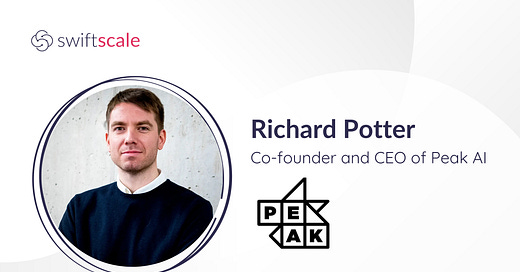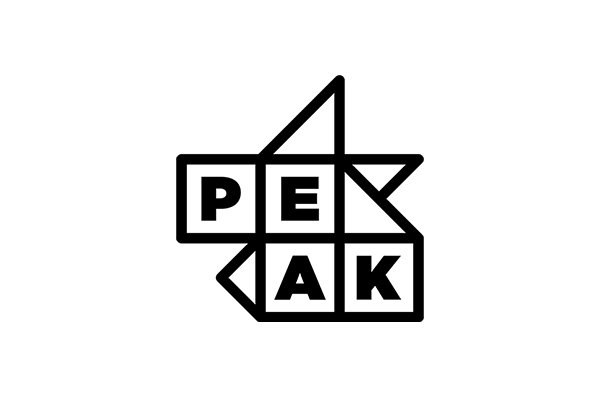Founder in Focus: Richard Potter, Peak AI
We sit down with Richard Potter, founder of Peak AI to find out why he believes that product-market fit is more important than go-to-market fit and what the key to his success really is.
They say the best ideas are born in pubs.
For Richard Potter and his co-founders Atul Sharma and David Leitch, the idea for Peak AI was doodled on a napkin over a pint in a Manchester pub in 2015.
With a background in analytics and tech, the team couldn’t understand why so few companies could harness data for decision-making. They were frustrated by the fragmentation of data across organisations and the silos that prevented collaboration and data-driven insights.
They also shared a belief that all companies would eventually implement AI as part of their operations, so they launched Peak to make AI accessible for every business. What started as a consultancy soon became a SaaS platform and the team started raising venture capital.
Under Richard’s stewardship, Peak has raised $119m to date and grown to over 300 employees across the UK, US and India. Customers include Nike, Pepsi Co, Eurocell and Pretty Little Things.
Over a video call, we found Richard refreshingly frank and resolute—adamant in his beliefs, such as why product-market fit is more important than go-to-market, and how Peak’s ultimate success depends on delivering tangible results for customers. Richard was also open about the challenges he and Peak have faced, and how their absolute focus on company culture has proved invaluable for their growth.
About Peak
Peak is an AI platform that optimises inventories and pricing for businesses with millions to billions of revenue. With a core belief that businesses need their own AI, Peak’s pre-built AI products can be configured to fit unique requirements.
Their dogged commitment to customer-centricity has allowed Peak’s platform to deliver significant revenues and efficiency for users. It's why their customer base is so impressive, including global industry leaders like Nike, Molson Coors, Marshalls and Eurocell.
The interview
We always start by asking founders or operators “why this?”, “why now?” and “why you?” Answers to these questions peel back the lid on what makes founders tick, why their solution will succeed and ultimately, why you should care.
Why now?
In the early days, we had to really convince people that AI was going to be the way it is, that AI was going to be the future of how they would run their businesses. There was a lot of explaining to do!
We don't have to do that anymore because businesses have come around to the use of AI. They understand that they need to rethink how they run their companies because AI is offering them a leap forward in performance and efficiency. There's huge demand now and it’s the topic in every boardroom. Every exec team needs an AI strategy.
Why this?
The purpose of Peak is to help all businesses perform better using data and artificial intelligence. Our goal is to put AI in the hands of companies that otherwise couldn't use it to run their businesses.
A lot of businesses sell products. They need to manage product inventories, promote them to their customers and price their products well. So that's what we do because that's how our customers make money. Our AI products focus on those things and do it very well. We're not trying to be an all-purpose piece of tooling, because my view has always been that big tech companies will build that themselves.
You can't turn a regular established business into an AI company from within. You need external help. My view was that there’s a big market for regular businesses that need a turnkey solution. That's what we've tried to be over the years.
Companies want AI solutions to business problems, and we have what we think are the two best AI systems out there for inventory and price management. I think the market is going to be huge, and if we're right, the alternative choice for almost all of our customers is that they just won’t be able to do it.
Why you?
There are three of us as founders at Peak. We mix technical, highly commercial and practical skills across the three of us, which has been very useful over the years. I also think we've got a good vision and good product intuition. We understand what our customers want and therefore we built something that people will actually use. A lot of startups build stuff that is a figment of their own imagination and there's no market for it.
We've also built a very talented, technical team in two locations. We do almost all of our software engineering in India (where my co-founder is from) and pretty much all of our Machine Learning AI expertise is in Manchester.
We're competing on a global scale, but our talent pool is lower cost than if we were doing this from somewhere like Silicon Valley or New York. We’re able to have about 65 data scientists and machine learning engineers and all of them have at least a master's in data science and more than half have a PhD in something mathematical and technical.
We've also invested a lot in company culture from day one. To be honest, when we started, it was new to put culture at the heart of your business strategy. Now that we've scaled the business to a couple of hundred people, we have a really strong, consistent culture, with a set of core principles, values and behaviours that we operate to. It’s not always easy and we don't always get it right, but having these principles and values really helps.
Moreover, our technology actually works! If the tech doesn't work and you can't sell it, then you're not going to be successful.
And the final thing is focus. We went broad to start with. We wanted to tackle many problems to see where we added the most value. Over time, we've narrowed our focus quite substantially into a couple of areas where we're really strong. I think that focus is really helpful because then you can be the best at a couple of things and if the market's big enough, you should win that market.
Did anything else help you achieve product-market fit?
Over the years I've come to have a bit of scepticism for traditional or commonly held beliefs in SaaS and startups. I think there's a big difference between product-market fit and go-to-market fit. I think that the downturn has clearly shown that.
During the up times, there was a lot of capital, so people threw a lot of money at their go-to-market, which hid loads of inefficiencies. These companies grew but at great expense. Now that everyone's had to rein in their spending, growth has shrunk, which is partly market conditions, but it's also partly because of massive inefficiencies and people's go-to-market strategy.
There's that old saying which is that the best product in the world sold badly is never going to out-compete an average product sold brilliantly. So that, for me, is the thing that companies like us need to focus on: how do we take our products to market in a brilliant way?
I think that classic SaaS thinking conflates those two things into one thing and therefore people get confused as to whether they have product-market fit or not.
What are the biggest challenges you’ve had to overcome?
The journey with Peak in this tech downturn has been hard. Worse than COVID, because the funding markets and the macroeconomy changed almost overnight. Our team is about half the size it was two and a half years ago and we were typically growing 80-90% a year before the crash. We had a business that was all out growth and capital efficiency and we’d built a really strong culture and identity, so it was really hard to make those changes. We had to build it back. Build back trust in the company and build back self-belief and it's taken a long time.
So, the last two and a half years have been the hardest. Still, you learn something every day and I enjoy what we do. Business is always more fun when you're growing fast because it hides all the problems!
On the flip side, what factors have contributed most to your business's success?
I think that we have a very strong skill in understanding a real-world business problem and we’re able to solve it with technology. I think that has been a big protective force for us. During this downturn, a lot of SaaS businesses were selling to each other in a circular economy of software. That is like a house of cards in a downturn like this. Whereas the thing that protected us is that we're selling outside of that and we're creating value for real customers.
We haven't gone backwards, because that all comes from that underlying strength, that we're very practical with our technology and it's not tech for tech's sake. It's tech for business outcomes.
If you were starting out again, would you give any advice to your younger self?
I think you have to learn it through experience. So, there are certain things that I know now that I didn't know then, but I think if I told my younger self, that person wouldn’t have listened!
If I was to say something, the biggest one is to have conviction. I think I've learned to have much more conviction in my own beliefs.
There are certain fallacies in how you scale a team and how you build a business. If you look at the best startups, the biggest startups, they're still very founder, CEO-directed and led. It's tiring at times and it's stressful, so sometimes you look for other people to help with that. But, I think that having conviction in your own beliefs would be the one train of thought that I've got now that I probably didn't have as much of then.
Because the world is different, if I were doing it again now, I would also do it totally differently. I would raise less capital, I would do it with fewer people and use AI to build our company and product. I think it'll be possible to build big, important and very profitable SaaS businesses that have been built AI-first in the next few years.
Which founders are inspiring you now and why?
I usually get inspiration from people who are just incredibly good at what they do. I’ve met a lot of them over the years and I work with many of them. They’re investors, other CEOs and so on. I really appreciate people who seem to be able to do what they do, be successful, but do it by staying true to their values, with a smile on their face and with humility. You don't see that often with the breakthrough success stories. So it feels churlish to sort of throw off names in that sense. None of them are celebrities like Elon Musk or people like that.
We’re swiftscale and we matchmake founders, investors and executives and its the quality of our network that sets us apart.
Get in touch: hello@swiftscale.co






